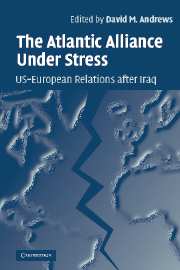Book contents
- Frontmatter
- Contents
- List of contributors
- Preface
- Introduction
- I The Iraq War and the Atlantic alliance
- II National policies within the Alliance
- 4 US politics and transatlantic relations: we are all Europeans now
- 5 Three rifts, two reconciliations: Franco-American relations during the Fifth Republic
- 6 Security exporters: Germany, the United States, and transatlantic cooperation
- 7 A bridge too far: the United Kingdom and the transatlantic relationship
- 8 The richest and farthest master is always best: US–Italian relations in historical perspective
- III Prospects for the Alliance
- References
- Index
6 - Security exporters: Germany, the United States, and transatlantic cooperation
Published online by Cambridge University Press: 22 September 2009
- Frontmatter
- Contents
- List of contributors
- Preface
- Introduction
- I The Iraq War and the Atlantic alliance
- II National policies within the Alliance
- 4 US politics and transatlantic relations: we are all Europeans now
- 5 Three rifts, two reconciliations: Franco-American relations during the Fifth Republic
- 6 Security exporters: Germany, the United States, and transatlantic cooperation
- 7 A bridge too far: the United Kingdom and the transatlantic relationship
- 8 The richest and farthest master is always best: US–Italian relations in historical perspective
- III Prospects for the Alliance
- References
- Index
Summary
The transatlantic crisis over the Iraq War presented many surprises to observers of European–American relations. One of the most unexpected developments, and the one that made this crisis very different from earlier transatlantic disagreements, was the line taken by Germany. Since World War II, it had always been among the strongest supporters of the United States in the global arena. Though it frequently disagreed with specific American policies, Germany always expressed its disapproval cautiously, qualified by statements underlining the preeminence of the transatlantic alliance. In 2002–3, however, it was at the forefront of European opposition to the course pursued by the Bush administration, and it actively tried to build an international coalition with the goal of undermining American efforts to obtain international legitimacy for the war in Iraq. Germany's chancellor was reelected after a campaign in which he capitalized heavily on condemning American policies.
This is not the only development indicating an astonishing transformation of the basic tenets of Germany's international policy. Since World War II, Germany had been fundamentally opposed to participating in military operations outside the NATO alliance's territorial space (so-called out-of-area operations); support for US-led campaigns in international trouble spots was limited to financial and logistical assistance. Yet at this very moment, Germany is the second- or third-largest provider of peacekeeping forces in the world, a striking change within a very short period.
- Type
- Chapter
- Information
- The Atlantic Alliance Under StressUS-European Relations after Iraq, pp. 128 - 151Publisher: Cambridge University PressPrint publication year: 2005
- 2
- Cited by

